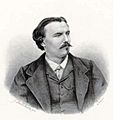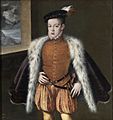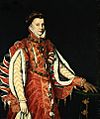Don Carlos facts for kids
Don Carlos is a famous opera created by Giuseppe Verdi. It tells a story through music and singing. The words, called a libretto, were written in French by Camille du Locle and Joseph Méry. The opera is based on a well-known German play called Don Carlos, Infante of Spain by Friedrich Schiller.
Schiller’s play is inspired by the real-life story of Carlos, Prince of Asturias (1545-1568). Prince Carlos was supposed to marry Elisabeth of Valois. But his father, Philip II of Spain, changed his mind. The King married Elisabeth himself instead. This marriage was part of a peace treaty. It ended a war between the powerful families of Habsburg and Valois.
The opera was first performed in Paris on 11 March 1867. It has five acts, which are like chapters in a book.
Don Carlos was made for performances in Paris. Back then, French operas were usually very long. They often included a lot of ballet music too. Verdi’s opera had five acts. When it was performed in other countries, people thought it was too long. So, many parts were cut out. Sometimes, even the whole first act was removed. This was a shame because Act One has important music. Its tunes appear again later in the opera. Since the early 20th century, most of Act One is usually performed. Many different versions of the opera exist today. When the opera is sung in Italian, it is called Don Carlo.
Contents
Who are the Characters?
Here are the main characters in the opera:
| Role | Voice type | Original Singer (1867) | Singer in Revised Version (1884) |
|---|---|---|---|
| Philip II, King of Spain | bass | Louis-Henri Obin | Alessandro Silvestri |
| Don Carlos, Prince of Spain | tenor | A. Morère | Francesco Tamagno |
| Rodrigue, Marquis of Posa | baritone | Jean-Baptiste Faure | Paolo Lhérie |
| The Grand Inquisitor | bass | David | Francesco Navarini |
| Elisabeth of Valois | soprano | Marie-Constance Sass | Abigaille Bruschi-Chiatti |
| Princess Eboli | mezzo-soprano | Pauline Gueymard-Lauters | Giuseppina Pasqua |
| A monk | bass | Armand Castelmary | Leopoldo Cromberg |
| Thibault, Elisabeth's page | soprano | Leonia Leveilly | Amelia Garten |
| A Voice from Heaven | soprano | ||
| The Count of Lerma | tenor | Gaspard | Angelo Fiorentini |
| Royal Herald | tenor | Mermant | Angelo Fiorentini |
| Countess of Aremberg | silent | Dominique | |
| Other characters: Flemish leaders, religious judges, Spanish court members, people, pages, guards, monks, soldiers (chorus) | |||
What is the Story About?
The story happens as Spain is ending a war with France. The two countries have agreed that Don Carlos, the Spanish prince, will marry Elisabeth. She is the daughter of the King of France.
Act 1: A Secret Love
Don Carlos wants to meet the girl he is going to marry. He travels to France. He secretly joins a royal hunt where Elisabeth is present. Elisabeth and her page get separated from the others. Carlos talks to her and offers to help her find her way back.
The princess asks him about the prince she is to marry. Carlos says she should not worry. He tells her the prince is kind and loves her. Then he shows Elisabeth a picture of the prince. Elisabeth realizes she is talking to the prince himself! They sing a beautiful love song together.
Suddenly, Spanish officials arrive. They tell Elisabeth that the plan has changed. She will not marry the prince. Instead, she must marry his father, the King of Spain. The two lovers are very sad to hear this news. The crowd of people beg Elisabeth to agree to marry the King. They say it will stop the war. In the end, she agrees.
Act 2: Friends and Secrets
Don Carlos goes to a monastery to be alone with his sadness. His grandfather, Charles V, spent his last days there. A monk talks to Carlos. Carlos thinks the monk looks like his grandfather.
Carlos feels happy when his friend Rodrigue arrives. Rodrigue has just returned from Flanders. There is still a lot of fighting there. Carlos tells Rodrigue his secret: he loves Elisabeth. She is now married to his father and is the Queen of Spain. Rodrigue tells Carlos he should help the poor people of Flanders. The King and Queen then walk past the tomb.
When the Queen leaves the church, she goes to the garden. Her ladies-in-waiting are waiting for her. A messenger gives her a letter from her mother in Paris. At the same time, he secretly gives her a letter from Carlos. Rodrigue quietly talks to Eboli, the Queen’s lady-in-waiting. The Queen reads her letters. Rodrigue asks the Queen to convince the King to let Carlos speak with him. Eboli is in love with Carlos. She has noticed Carlos acts strangely around the Queen. Eboli thinks it is because Carlos loves her (Eboli).
Carlos gets a chance to meet Elisabeth alone. He calmly asks her to persuade the King to send him to Flanders. But he is not truly calm. Soon, he becomes angry with her. He feels she is not showing him any love. She tells him it is her duty now that she is Queen. Carlos understands, but he still loves her. He falls to her feet. He grabs her and tells her he loves her. But the Queen pulls away from him. He rushes off, feeling hopeless.
The King comes out of church. He is very angry that his wife was left alone. He tells the lady-in-waiting to leave. The Queen comforts her. Then she and her ladies leave.
Rodrigue asks the King to stop fighting the people of Flanders. They are still dying and starving. The King says they were disloyal and deserve to be punished. He tells Rodrigue that he is worried about Elisabeth and Carlos. He warns Rodrigue about the Inquisition.
Act 3: A Public Punishment
A masked ball is happening at the palace in Madrid. Carlos is waiting in the Queen’s garden. A lady comes to the garden. She is wearing a mask, like everyone else. He thinks it is the Queen and tells her how much he loves her. When the lady takes off her mask, he realizes it is Eboli. She accuses him of loving the Queen. Just then, Rodrigue arrives. He tells Eboli that Carlos is not well and does not know what he is saying. But Eboli is not fooled. She plans to ruin their love affair.
The second part of this act takes place in a square in Madrid. A ceremony called an auto-da-fé is being prepared. During the Spanish Inquisition, this was a ceremony. People who did not agree with the Roman Catholic church were punished severely. Sometimes they were burned. Monks enter, followed by the unfortunate people who will be punished. The crowd sings about the greatness of Spain. King Philippe appears. He repeats that he will fight anyone who is an enemy of the Roman Catholic Church.
Six people, including Carlos, come forward. They fall at the King’s feet. They beg him to stop his soldiers from harming the Flemish people. The King refuses to listen. Some people in the crowd support the King. Others beg him to show mercy. Carlos then asks his father to let him rule Flanders. The King refuses. He realizes this could lead to Carlos and the Flemish people rising against him. Carlos is desperate. He pulls out his sword and says he will save Flanders. The crowd is terrified to see him act this way in front of the King. The King orders his soldiers to take Carlos’s sword. But no one obeys him. Finally, Rodrigue steps in. He knows this situation is bad. He calmly asks Carlos for the sword. Carlos hands it over, and Rodrigue gives it to the King. The monks continue their procession. A voice from heaven promises peace in the world to come.
Act 4: Betrayal and Sacrifice
The King is alone in church. In a beautiful aria (a song for one voice), he sings about his sadness. He feels his wife does not love him. The Grand Inquisitor enters. He is very old and blind. The King tells him about his son. He asks the Inquisitor if Carlos should be forgiven or punished. The Inquisitor replies that Rodrigue should be killed. The King dares to disagree. The Inquisitor tells the King that he is not fully devoted to God. The Inquisitor leaves.
The Queen rushes in. She asks the King to help her find a jewel box that has disappeared from her room. The King shows her that it is on the table. He tells her she must open it. She does. Inside is a picture of Carlos. The King is very angry. He accuses her of being disloyal. She faints. The King calls Eboli and Rodrigue for help. The King feels bad for suspecting her. But Eboli feels even worse. She was the one who took the jewel box. She was jealous of Carlos and Elisabeth. It was Eboli who suggested the King look in the box. Rodrigue feels he can only save his friend by offering himself to be killed instead of Carlos. The King and Rodrigue leave.
Eboli throws herself at the Queen’s feet. The Queen has now woken up. Eboli confesses that she is guilty. She also admits she had a secret relationship with the King. Elisabeth remains calm. But she tells Eboli to leave her forever and go live in a nunnery. When Eboli is alone, she expresses her terrible sadness. Before she goes to the nunnery, she has one more thing to do: try to save Carlos from being put to death.
The second part of this act shows Carlos in prison. Rodrigue comes to him. He knows that letters from Flanders, addressed to Carlos, have been found with him. Someone enters and kills Rodrigue. As he dies, Rodrigue tells Carlos that the Queen will wait for him the next day. She will be outside the nunnery to see him one last time. Rodrigue dies.
Sometimes Act IV ends here. But some performances continue with a scene. In this scene, the King tries to give the sword back to his son. But Carlos accuses him of murdering his friend. A group of people, including Eboli, enter the prison. They cry to the King to set Carlos free. The Inquisitor appears. He angrily tells the crowd they are wrong to go against God’s will. He tells them all to kneel and ask for forgiveness.
Act 5: The Final Meeting
Elisabeth kneels before the tomb of Charles V. She sings about her lost youth in France. Some of the music from Act I returns here. She prays for peace. Elisabeth and Carlos then meet for the last time. This is their third duet in the opera. They wish for happier times.
The King and the Inquisitor have been hiding. They now appear and grab Carlos. The guards are told to seize him. But Carlos defends himself. Suddenly, the voice of Charles V (or a monk in disguise) is heard. He takes his grandson into the safety of the cloister (a quiet, covered walkway in a monastery).
Why is Don Carlos Important?
Don Carlos is a truly great opera. It features some of Verdi’s best music. This is especially true for the music in Act IV, scene 1. In that part, all the events from earlier acts come together. There are wonderful duets (songs for two singers). Carlos and Elisabeth have three duets. There are also great bass arias (songs for one singer). However, the opera is very long. It is hard to cut any of the singing without spoiling the story.
Some people feel that the ending of the opera is not as strong as it could be. In Schiller’s original play, the ending is different. Carlos is handed over to the Inquisition and put to death.
- The New Kobbe’s Opera Book, edited by The Earl of Harewood and Antony Peattie. London: Ebury Press, ISBN: 0-09-187093-3
Images for kids
-
The historical Don Carlos - portrait by Sofonisba Anguissola, 1560
-
The historical Elizabeth of Valois, by Juan Pantoja de la Cruz, 1565
-
Costume design for Charles V, act 5
See also
 In Spanish: Don Carlos (ópera) para niños
In Spanish: Don Carlos (ópera) para niños











